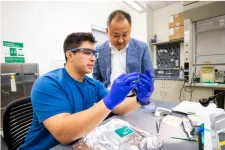(Press-News.org) Opioid addiction is a pressing public health crisis with far-reaching implications. More than 100,000 deaths a year have been linked to drug overdoses since 2020.
The Centers for Disease Control and Prevention reports that more people died from drug overdoses in 2021 than from firearm and motor vehicle deaths combined. Three-quarters of these overdose deaths were attributable to opioids.
A five-year, $3.5 million grant from the National Institutes of Health’s National Institute on Drug Abuse will fund the Virginia Tech Department of Chemical Engineering’s pioneering research to understand how adolescent exposure may contribute to opioid addiction. Examples of adolescent exposure include youth taking prescribed opioid medication for pain relief following a sports injury or experiencing neglect in instances of parental opioid addiction.
Chang Lu, the Fred W. Bull Professor of Chemical Engineering and graduate chair, will serve as the contact principal investigator of the initiative, leading a team in the research.
Chemical engineers bring in unique skills
According to Lu, chemical engineers have a unique set of skills that they can leverage in chemistry, biotechnology, and process engineering to clarify how addiction takes hold, making it possible to eventually develop processes and products that alleviate the societal burden of drug addiction. Additionally, their proficiency in data analysis and modeling allows them to develop the tools required to unveil complex neural networks, opening new avenues for brain research.
Lu’s team in the initiative includes Julie Blendy, professor of pharmacology at the University of Pennsylvania, and Wei Wang, professor of chemistry and biochemistry at the University of California, San Diego.
Blendy’s expertise in long-lasting effects of adolescent oxycodone exposure on reward-related behavior and gene expression in mice make her an ideal collaborator for the initiative. Likewise, Wang brings proficiency in analyzing large data sets like the ones that will be generated in the research.
“My research at University of Pennsylvania focuses on understanding the molecular basis for the biochemical and behavioral changes that come with chronic drug use," noted Blendy. “How drugs lead to long-term adaptations within the brain to impact drug-taking behavior is not known, but alterations in gene expressions are likely involved. Our team — led by Lu — is well-poised to significantly advance the field in understanding the biological basis of addiction.”
A complex problem
Opioid addiction is a multifaceted issue, involving both genetic and environmental components. Genetic factors can predispose individuals to addiction vulnerability, influencing how their brains respond to opioids.
Environmental factors such as early-life adversity, social networks, and access to opioids play pivotal roles in addiction initiation and maintenance. Understanding how genes and the environment interact at the molecular level is central to understanding the neurobiology of addiction. Epigenetics, the study of how behaviors and environment can cause changes in how genes work, provides valuable insights into the gene-environment interactions that drive addiction.
In this project, Lu’s team will focus particularly on one environmental factor: How early exposure to opioids potentially contributes to addiction. "When adolescents are injured during sports, they are often prescribed strong pain relievers that contain opioids,” Lu said. “It is important to understand what footprint such early exposure leaves in a developing brain, in terms of epigenetic alterations.”
A bridge between genes and the environment
Epigenetics refers to hereditary changes in gene expression that do not involve alterations to the DNA sequence. Epigenetic modifications alter the accessibility of DNA and play critical roles in regulating gene expression and shaping an individual's response to environmental stimuli.
Many of the genes that are thought to play a role in opioid addiction are involved in the endogenous opioid system, which is the body's internal system for regulating pain, reward, and addictive behaviors. It consists of opioid substances produced naturally within the body, called endogenous opioids, and their receptors, into which opioids fit like keys into locks.
Opioids introduced from outside the body, called exogenous opioids, including opioid medications and heroin, also act on these receptors. Variations in the genes that provide instructions for making opioid receptors have been studied extensively as genetic risk factors for opioid addiction. Researchers hypothesize that differences in the receptors' structure and function influence how the body responds to opioids.
Using low-input epigenetic profiling techniques developed in Lu’s lab, the team is better able to study gene-environment interactions in the brain. These techniques will allow them to examine epigenetic changes within limited quantities of brain tissue, making it feasible to explore the dynamics of specific brain regions and cell types involved in addiction.
Key insights gleaned by this approach include
Identifying epigenetic biomarkers. These biomarkers may serve as diagnostic tools for assessing an individual's risk of addiction or as targets for therapeutic interventions.
Unraveling developmental trajectories. Epigenetic profiling can reveal how adolescent experiences and environmental factors shape epigenetic patterns over time, offering insights into critical windows of vulnerability to opioid addiction.
Personalized medicine. Tailoring interventions based on an individual's epigenetic makeup may enhance treatment efficacy and reduce the risk of relapse.
Informing policy changes. A fundamental understanding of how opioid addiction works in the brain can inform policy and regulatory decisions.
“Opioid addiction is a complex and devastating public health crisis,” said Lu. “Low-input epigenetic profiling is a powerful tool in unraveling the intricate gene-environment interactions that underlie addiction vulnerability and progression. By studying epigenetic dynamics within specific brain regions and cell types, we hope to identify biomarkers and shed light on when people – especially adolescents – are vulnerable to addiction, and why. Successfully doing so means opening the door to personalized treatment approaches and prevention strategies in the future.”
END
Department of Chemical Engineering receives $3.5 million award to study impact of adolescent exposure to opioids
2023-11-16
ELSE PRESS RELEASES FROM THIS DATE:
Terrorism rather than pandemics more concerning for those with those with authoritarian views, analysis shows
2023-11-16
Those with authoritarian political views are more likely to be concerned about terrorism and border control than a future new health pandemic, new research shows.
During the pandemic, rather than a desire for a stronger government with the ability to impose measures to address the pandemic and its consequences, people with authoritarian views rejected this and embraced individual autonomy.
Researchers analysed public perceptions of security threats in 2012 and in 2020. They believe COVID-19 belongs to a distinct category of threats of which those with authoritarian views are less ...
University of Miami receives $1.8 million NOAA grant to study South Florida’s coastal ecosystems
2023-11-16
The University of Miami Rosenstiel School of Marine, Atmospheric, and Earth Science has been awarded a nearly $1.8 million grant from the National Oceanic and Atmospheric Administration (NOAA) as part of an anticipated four-year, $4.2 million project to support research on the impacts to South Florida’s coastal ecosystems from a multitude of climate change stressors.
The newly funded project, co-led by the University of Miami Rosenstiel School and NOAA’s Atlantic Oceanographic and Meteorological Laboratory (AOML) will focus on climate impacts to South Florida’s coastal and marine ecosystems, including the Florida Keys National Marine Sanctuary ...
USF researchers help reduce lead levels in Madagascar drinking water
2023-11-16
TAMPA, Fla. (Nov. 16, 2023) -- A team of engineers and public health experts from the University of South Florida is helping Toamasina, Madagascar, residents reduce their exposure to lead – a major global environmental pollutant that causes more than 1 million premature deaths each year. By combining efforts to replace water pumps and educate city technicians, USF researchers helped decrease the blood lead levels of 87 percent of the children tested during their study.
“They were taking old car batteries and melting them down to make check ...
UofL law professor developing generative AI toolkit to aid legal writing instruction
2023-11-16
LOUISVILLE, Ky. – While many are wary of artificial intelligence and its feared effect of supplanting the human creation of content, one University of Louisville professor is leading an effort to help her colleagues use it in the classroom.
Susan Tanner, assistant professor of law at UofL’s Brandeis Law School, has won a teaching grant from the Association of Legal Writing Directors to develop a toolkit that law professors anywhere can use to incorporate generative artificial intelligence (genAI) into their legal writing curricula.
GenAI is technology that can create text, images, videos and other media in response to prompts inputted by a user – otherwise known ...
Novel predictor of prediabetes in Latino youth identified in new USC study
2023-11-16
A team of researchers from the Keck School of Medicine of USC have identified two metabolites, substances produced by the body during metabolism, that may help predict which young Latino people are most likely to develop prediabetes, a precursor to developing type 2 diabetes.
The study, funded by the National Institutes of Health and published in Diabetes Care, is the first large-scale study to look at metabolites as possible predictors of prediabetes or type 2 diabetes in young Latino people. The researchers found that when they added these two metabolites to current prediction models, they could more accurately ...
More than 1 in 10 pediatric ambulance runs are for mental health emergencies
2023-11-16
A new study offers a novel look at the scope of the youth mental health crisis across the United States – in 2019-2020, more than 1 in 10 kids who were brought to the hospital by ambulance had a behavioral health emergency. Out of these behavioral health emergencies, 85 percent were in 12-17-year-olds. Findings were published in the journal Academic Emergency Medicine.
“Our study found that pediatric behavioral health emergencies requiring an ambulance were much too frequent,” said senior author Jennifer Hoffmann, MD, MS, emergency ...
Sunny Jardine appointed new Editor-in-Chief of Marine Resource Economics
2023-11-16
Marine Resource Economics (MRE) is proud to announce the appointment of Sunny Jardine as the journal’s new Editor in Chief, effective January 8, 2024. Jardine is an associate professor and the Rae S. and Bell M. Shimada Endowed Faculty Fellow in Memory of Warren S. Wooster in the School of Marine and Environmental Affairs at the University of Washington.
Professor Jardine has supported MRE as a long-time associate editor. In that capacity, she handled papers across a range of marine and resource economics applications. She brings expertise in commercial fisheries management, conservation planning, the ...
Mayo Clinic and Columbia University receive $10.6 million grant from NCI to advance glioblastoma research with mathematical oncology
2023-11-16
Mayo Clinic Comprehensive Cancer Center and Columbia University received a five-year, $10.6 million U54 center grant from the National Cancer Institute (NCI) to further study combining the molecular analysis of glioblastoma with MRI.
Glioblastoma is a fast-growing and aggressive brain tumor that begins as a growth of cells in the brain or spinal cord. As it grows, it can invade and destroy healthy tissue. There is no cure, but treatments may slow the cancer's growth and reduce symptoms.
Glioblastoma is a diverse cancer, which means ...
A new ultrasound patch can measure how full your bladder is
2023-11-16
CAMBRIDGE, MA -- MIT researchers have designed a wearable ultrasound monitor, in the form of a patch, that can image organs within the body without the need for an ultrasound operator or application of gel.
In a new study, the researchers showed that their patch can accurately image the bladder and determine how full it is. This could help patients with bladder or kidney disorders more easily track whether these organs are functioning properly, the researchers say.
This approach could also be adapted to monitor other organs within the body by changing the location of the ultrasound array and tuning the frequency ...
Cognitive and emotional well-being of preschool children before and during the pandemic
2023-11-16
About The Study: Pandemic-exposed children (assessment after March 11, 2020) had significantly higher problem solving and fine motor skills at 24 months of age but lower personal-social skills compared with non-exposed children in this study including data from the Ontario Birth Study. At 54 months of age, pandemic-exposed children had significantly higher vocabulary, visual memory, and overall cognitive performance compared with non-exposed children.
Authors: Mark Wade, Ph.D., C.Psych., of the University of Toronto, is the corresponding author.
To access the embargoed study: Visit our For The Media website ...





